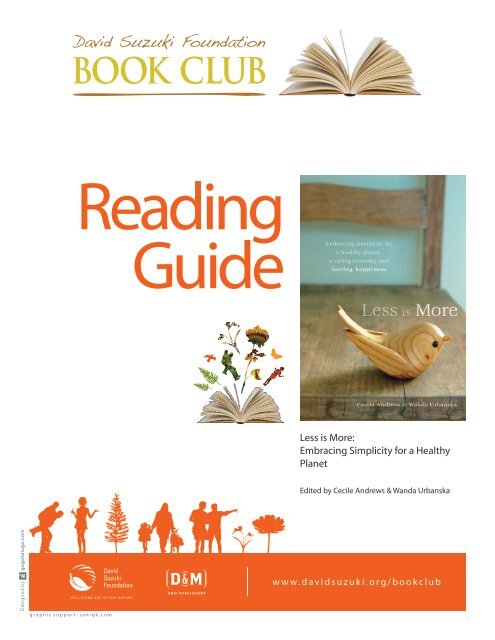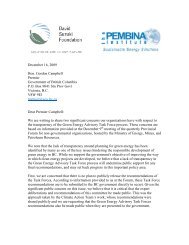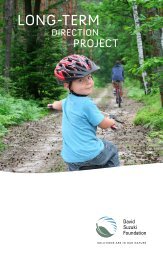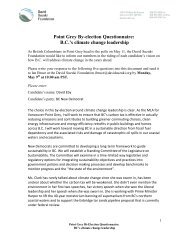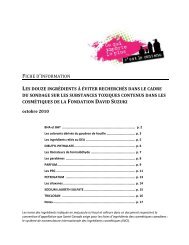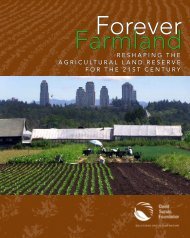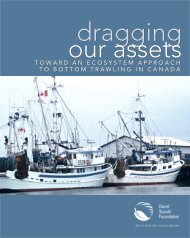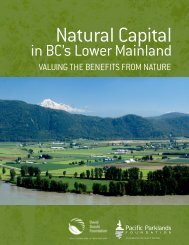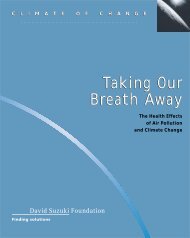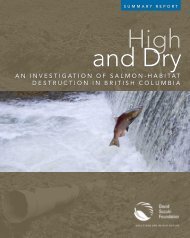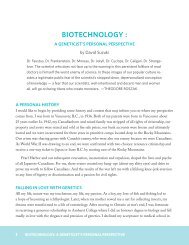Reading Guide-Less is More (PDF) - David Suzuki Foundation
Reading Guide-Less is More (PDF) - David Suzuki Foundation
Reading Guide-Less is More (PDF) - David Suzuki Foundation
- No tags were found...
Create successful ePaper yourself
Turn your PDF publications into a flip-book with our unique Google optimized e-Paper software.
Welcome Readers!Thank you for participating in the <strong>David</strong> <strong>Suzuki</strong> <strong>Foundation</strong> Book Club! It’s an opportunity for Canadiansto take part in a broader d<strong>is</strong>cussion about our shared future. Whether you gather online or in your localcommunities, we hope the conversations inspired by reading our selections will motivate everyone towork together to protect the diversity of nature and our quality of life, now and for the future.Our second selection, <strong>Less</strong> <strong>is</strong> <strong>More</strong>, <strong>is</strong> a group of thought-provoking essays on voluntary simplicity,compiled by Cecile Andrews and Wanda Urbanska. W<strong>is</strong>dom traditions have always taught the valueof simplicity but today, finding more balanced ways of living has become a necessity. Climate change,economic insecurity, and the end of cheap oil mean that a life driven by consumption <strong>is</strong> no longer possible.Th<strong>is</strong> reading guide <strong>is</strong> designed to help stimulate personal reflections and meaningful d<strong>is</strong>cussions aroundthe <strong>is</strong>sues of balance and sustainability. It includes d<strong>is</strong>cussion questions to get conversations started andideas for taking concrete action individually and as a community.We believe that the themes found in <strong>Less</strong> <strong>is</strong> <strong>More</strong> will help Canadians explore the exciting possibilitysimplicity holds as an individual and collective response to the planetary cr<strong>is</strong><strong>is</strong>. We hope everyoneinvolved in the <strong>David</strong> <strong>Suzuki</strong> <strong>Foundation</strong> Book Club <strong>is</strong> inspired to initiate change at the local level. Pleasejoin us on Facebook and share your reflections!Warm w<strong>is</strong>hes,Aryne SheppardManager of Community Leadership<strong>David</strong> <strong>Suzuki</strong> <strong>Foundation</strong>w w w . d a v i d s u z u k i . o r g / b o o k c l u b
D<strong>is</strong>cussion Questions1. What <strong>is</strong> simplicity? How can you apply the themes of simplicity found in <strong>Less</strong> <strong>is</strong> <strong>More</strong> to your life?2. Have you ever experienced ‘buyer’s remorse’? What situations or emotions make you buy somethingyou don’t really need?3. Wanda Urbanska, the author of “Simple Living: <strong>Less</strong>ons from the World of Telev<strong>is</strong>ion” wrote about “’TheThing That Refused to Die’” [LM 11]. Is there something in your closet or home that you are still usingafter many years?4. In “Why Isn’t Th<strong>is</strong> Empire Sustainable?” <strong>David</strong> Wann refers to polls which show that “more than half ofall Americans…would gladly trade a day’s pay every week for an extra day off” [LM 216]. Would you bewilling to take a pay cut for additional time off? What are the barriers to reducing the 40-hour week?5. The d<strong>is</strong>cussion about climate change often leads to worries about sustainability and the cost of greentechnology. But what <strong>is</strong> the economy for? What will happen when the global oil supply runs out?These are questions ra<strong>is</strong>ed in “What’s the Economy for, Anyway?” by John de Graaf [LM235].6. Make a l<strong>is</strong>t of things that make you happier. How many of these are tied toyour social status? How many are material objects?7. ‘Lagom’ <strong>is</strong> Swed<strong>is</strong>h for “exactly the right amount” [LM 102]. What <strong>is</strong> ‘lagom’ foryou? How often do the people around you stop at “exactly the right amount”?8. ‘Ecocide’ <strong>is</strong> the large scale destruction of the natural environment. Do youthink humans are committing ‘ecocide’? What would be your biggest‘crime’? Can you do anything to change th<strong>is</strong>?9. What would be an ideal day for you? How many things in your day requireyou to make a purchase? How many things involve being social andspending time with loved ones?10. “The typical urban resident waits in line for five years of h<strong>is</strong> or her life,” says <strong>David</strong> Wann in “Finding RealWealth: Twice the Value for Half the Resources” [LM 42]. We value our free time, yet we complicate ourlives with activities that we consider ‘wasting time’. What are some activities that waste your time? Isthere any way for you to reduce or change these activities to reclaim more of your time for yourself?w w w . d a v i d s u z u k i . o r g / b o o k c l u bPhoto credit: Katharine Byers
Take Action in your CommunityUse the activities l<strong>is</strong>ted below to bring your book club conversations to life!Start a simplicity circleA simplicity circle <strong>is</strong> a group of individuals that meets on a regular bas<strong>is</strong> to d<strong>is</strong>cuss ways to live moreconsciously. Getting together with others to talk about balanced living makes the practice easier toimplement. “Time to Talk! Creating Simplicity ConversationCircles” by Cecile Andrews [LM 251] provides helpful hints on howto organize a circle with people in your life.Tap into compassionIn “We Are Hard-wired to Care and Connect”, <strong>David</strong> Korten explainshow expressing positive emotions like compassion “triggers thebrain’s pleasure center and benefits our health by boosting ourimmune system” [LM 245]. Tap into these benefits by writing aletter or v<strong>is</strong>iting a loved one, and reconnecting in a meaningful way.Ask for changeVote with your voice and your dollars. Next time you are in a store that does not provide environmentallyor socially conscious items such as organic produce or fair trade products, let the staff know you areinterested in purchasing them. Most retailers care about what their customers want!Improve your communityIn “Changing the World One Block at a Time” [LM163], Jay Walljasper talks about how small changes at thelocal level can improve the lives of community residents. If there’s something you think can be improvedwhere you live, gather a group of like-minded folks and act toward change. Let us know what you do!Buy nothing day‘Buy Nothing Day’, dedicated to consuming less and reducing waste, takes place the Friday after AmericanThanksgiving. Choose to celebrate your own ‘Buy Nothing Day’ with friends and family, or challenge yourself toa week (or month!) of only buying the bare essentials.Read more from the authors you loveOne of the benefits of an anthology <strong>is</strong> that some writers speak to you more than others – and there’s somany to choose from! Each essay in <strong>Less</strong> <strong>is</strong> <strong>More</strong> includes an introduction about the author. Look for moretitles from those that inspire you.Start a book club!If you don’t have one already, <strong>Less</strong> <strong>is</strong> <strong>More</strong> <strong>is</strong> a great first read for a new Book Club. The chapters are shortand can be used as conversation starters. Start a book club at work or with your friends, and use yourfavourite chapter to start the d<strong>is</strong>cussion.w w w . d a v i d s u z u k i . o r g / b o o k c l u bg r a p h i c s u p p o r t : s a n i q k . c o mPhoto credit: Brooke McDonald


